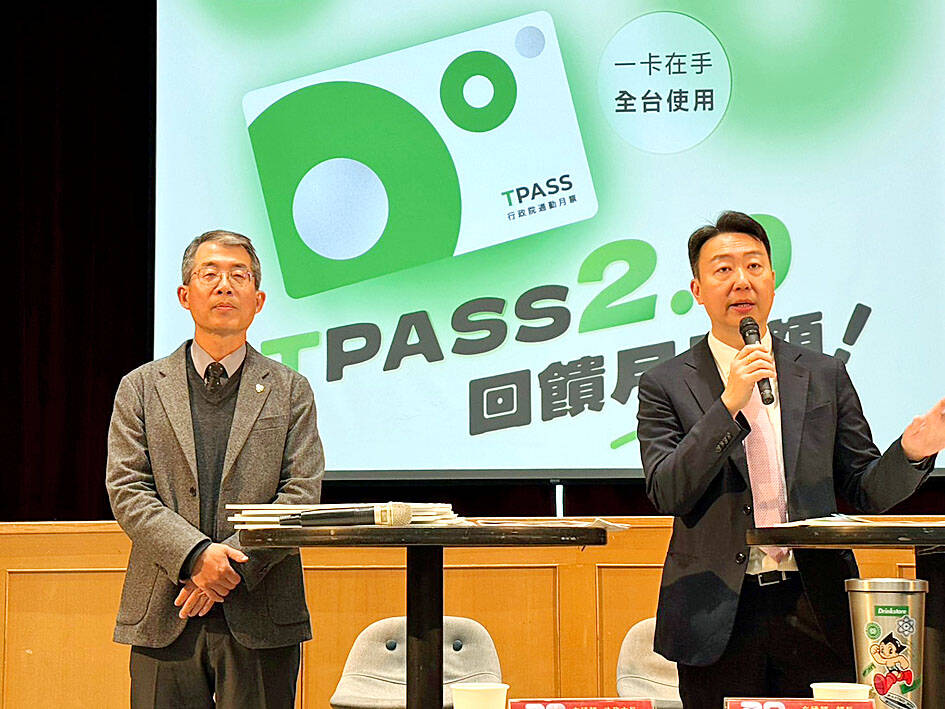The TPass 2.0 program is to be launched on Feb. 1, with the maximum rebate for frequent riders rising to 40 percent, the Ministry of Transportation and Communications said yesterday.
The original program was launched in 2023 as a monthly pass designed to encourage more people to use public transportation.
In addition to the TPass program offered by the Executive Yuan, local governments offer plans to attract commuters within city or county limits, or those traveling within certain regions.

Photo: CNA
TPass 2.0 is designed to attract those who might not use public transportation daily, but are nevertheless frequent users, Highway Bureau Director-General Chen Wen-juei (陳文瑞) told reporters at the ministry’s year-end news conference.
Unlike the original program, the updated version can be used to access public transportation systems nationwide, and all trips each month would be counted when calculating the rebate a commuter could receive the following month, Chen said.
Trips on medium-to-long-distance buses would also be counted in the frequent rider program, he said, adding that the rebates would be funded by the central government.
Meanwhile, users of the original TPass can obtain additional rebates by registering as frequent riders, he said.
Frequent riders of public buses, including city buses, highway buses and freeway buses, would receive a 15 percent rebate if they make 11 to 30 trips each month, while those who take a public bus 31 times or more would receive a 30 percent rebate, Chen said.
Railway services that already provide frequent riders programs — including train services by Taiwan Railway Corp (TRC), and the Taipei MRT and New Taipei City systems — would offer a 2 percent rebate for users who make more than 11 trips each month.
EasyCard, iPass and other electronic card users can enter the frequent riders programs, Chen said.
However, those who buy TPass 2.0 and register before March 31 can receive an additional 10 percent monthly rebate from the Executive Yuan if they meet the criteria for rebate each month, he said.
To illustrate how the rebate would be calculated, the Highway Bureau said that if a person makes 30 trips using public buses, 10 trips on the Taipei MRT and 18 trips on TRC trains within a month, which cost NT$500, NT$550 and NT$900 respectively, they would receive NT$93 as a rebate the following month if they use an EasyCard and NT$233 as a rebate if they use TPass 2.0.
TPass 2.0 users can receive a maximum 40 percent rebate if they make 31 trips on public buses, including 30 percent from frequent riders programs and 10 percent from the Executive Yuan, it said.
People can buy a TPass 2.0 card at convenience stores and 232 MRT stations across the nation, and start accumulating trips on Feb. 1, Chen said.
From March 25, frequent users can pick up their rebates at convenience stores or by using value-adding machines at Taipei MRT stations, he said, adding that the service would be available in more locations in June.
The original TPass program has greatly boosted passenger volume son public transportation systems since its launch, Highway Bureau data showed.
Passenger volumes on MRT and light rail systems rose 36.9 percent last year compared with 2022, while passenger volumes increased 19.6 percent on city and highway buses, 59.6 percent on bicycles and ferries, and 43.9 percent on TRC services.

Taiwan has received more than US$70 million in royalties as of the end of last year from developing the F-16V jet as countries worldwide purchase or upgrade to this popular model, government and military officials said on Saturday. Taiwan funded the development of the F-16V jet and ended up the sole investor as other countries withdrew from the program. Now the F-16V is increasingly popular and countries must pay Taiwan a percentage in royalties when they purchase new F-16V aircraft or upgrade older F-16 models. The next five years are expected to be the peak for these royalties, with Taiwan potentially earning

STAY IN YOUR LANE: As the US and Israel attack Iran, the ministry has warned China not to overstep by including Taiwanese citizens in its evacuation orders The Ministry of Foreign Affairs (MOFA) yesterday rebuked a statement by China’s embassy in Israel that it would evacuate Taiwanese holders of Chinese travel documents from Israel amid the latter’s escalating conflict with Iran. Tensions have risen across the Middle East in the wake of US and Israeli airstrikes on Iran beginning Saturday. China subsequently issued an evacuation notice for its citizens. In a news release, the Chinese embassy in Israel said holders of “Taiwan compatriot permits (台胞證)” issued to Taiwanese nationals by Chinese authorities for travel to China — could register for evacuation to Egypt. In Taipei, the ministry yesterday said Taiwan

Taiwan is awaiting official notification from the US regarding the status of the Agreement on Reciprocal Trade (ART) after the US Supreme Court ruled US President Donald Trump's global tariffs unconstitutional. Speaking to reporters before a legislative hearing today, Premier Cho Jung-tai (卓榮泰) said that Taiwan's negotiation team remains focused on ensuring that the bilateral trade deal remains intact despite the legal challenge to Trump's tariff policy. "The US has pledged to notify its trade partners once the subsequent administrative and legal processes are finalized, and that certainly includes Taiwan," Cho said when asked about opposition parties’ doubts that the ART was

If China chose to invade Taiwan tomorrow, it would only have to sever three undersea fiber-optic cable clusters to cause a data blackout, Jason Hsu (許毓仁), a senior fellow at the Hudson Institute and former Chinese Nationalist Party (KMT) legislator, told a US security panel yesterday. In a Taiwan contingency, cable disruption would be one of the earliest preinvasion actions and the signal that escalation had begun, he said, adding that Taiwan’s current cable repair capabilities are insufficient. The US-China Economic and Security Review Commission (USCC) yesterday held a hearing on US-China Competition Under the Sea, with Hsu speaking on